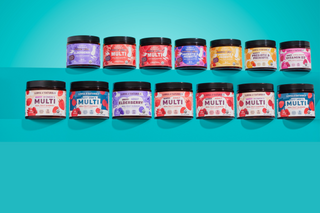Key Points:
- Vitamin D is a fat-soluble nutrient that your child needs to build and maintain healthy bones, amongst other essential functions in the body.
- There are two forms of vitamin D — vitamin D2 and vitamin D3.
- Your little one’s body can make vitamin D3 when exposed to sunlight, but many children don’t get enough sun exposure.
- Some food sources can provide vitamin D, but they’re generally not very kid-friendly, so your child may need a vitamin D supplement to support their health.

Vitamin D, also known as the “sunshine vitamin,” is an essential nutrient your child needs for bone health and overall wellness. They can get vitamin D from sunlight and a limited number of foods, but there’s a good chance that they’re not getting enough, especially during winter. Luckily there’s a wide range of child-friendly vitamin D supplements available to help boost vitamin D for kids.
This guide looks at what vitamin D is and the many benefits it provides to your little one. We’ll also explore how much vitamin D they need and where they can safely get enough of this important nutrient.
What Is Vitamin D for Kids?
Vitamin D is a fat-soluble vitamin that your child can get from certain food sources. It’s unique amongst the essential vitamins because the human body can also make it — if it’s exposed to enough sunlight, that is.
Vitamin D is found in two forms: vitamin D2 (ergocalciferol) and vitamin D3 (cholecalciferol). Confusingly, both are often referred to simply as vitamin D. There are some crucial differences, though:
- The body makes vitamin D3 when exposed to sunlight, and vitamin D3 is also found in animal food sources and a few plant-based sources.
- Vitamin D2 comes from plant sources that are exposed to sunlight. Vitamin D2 is also the form commonly used to fortify foods, as it’s cheaper to make than vitamin D3.
The body processes these forms of vitamin D slightly differently. And while they’re both available as supplements, vitamin D3 may be better at raising vitamin D levels in the body.
Benefits of Vitamin D for Kids

Getting enough vitamin D is essential for your child for many reasons, and one of the most important is bone health.
Vitamin D for kids helps their little bodies absorb and regulate calcium and phosphorus. Both these nutrients are essential for bone growth. They also help maintain and repair bones when they’re fractured or broken, which is always a risk if your child is active.
Without enough vitamin D and calcium, your little one may also be at risk of rickets, or weak bones, which means they’re more likely to break. Children with rickets can end up with stunted growth and bowed legs.
In addition to building strong bones, vitamin D for kids is involved in supporting muscle movement, heart health, and the nervous and immune systems. Recent studies during the current pandemic also show that it may help reduce the risk of testing positive for Coronavirus.
How Much Vitamin D Does Your Child Need?
The amount of vitamin D your child needs depends on their age, with two ranges — one for young babies and another for slightly older children and adolescents. Recommended daily amounts of vitamin D for kids are usually shown in micrograms (mcg), international units (IU), or both:
- 0-12 months: 10 micrograms or 400 international units
- 1-18 years: 15 micrograms or 600 international units
Signs of Vitamin D Deficiency
Certain factors do put children at increased risk of vitamin D deficiency. For example, if your child has dark skin, their body may not make as much vitamin D from sunlight. Obesity or medical conditions like celiac disease and cystic fibrosis may also mean your child isn’t getting enough vitamin D. Certain medications and even health supplements like St John’s Wort can also interfere with how the body uses vitamin D.
Consult your pediatrician or another healthcare provider if you’re worried that your child may not be getting enough. They will assess the risk factors and, if needed, recommend a blood test to check your little one’s vitamin D levels.
How to Boost Vitamin D for Kids

If you’re breastfeeding, your child can get some vitamin D from your breast milk. However, breast milk alone doesn’t provide enough vitamin D for babies, so you need to find ways to boost that. Sunlight can help, but with their sensitive skin, there’s a good chance your young child could get too much sun. The American Academy of Pediatrics recommends against exposing babies under six months to sunlight. So, if your child is breastfed, you may need to give them a daily supplement.
On the other hand, infant formula is usually fortified with vitamin D, so formula-fed babies should be getting their daily dose of vitamin D that way.
As your child gets a little older and can manage some sun exposure, that’s your first prize — assuming it’s summer, of course, as winter sunlight can be too weak to make a difference. It’s a delicate balance, though, as too much summer sun could put your child at risk of skin cancer. And unfortunately, using sunscreen to solve the issue limits vitamin D absorption along with those unwanted UV rays.
Luckily, your little one only needs 10 to 15 minutes of direct sunlight a day (i.e., not through a window or on a cloudy day). After that, you should start slathering on sunscreen and ensure they’re wearing a hat — they’ll still get some vitamin D but without the extra risk.
Food Sources of Vitamin D for Kids
There are some whole food sources of vitamin D for kids, such as: egg yolks, fatty fish like sardines, tuna, mackerel, fish liver oils, beef liver, and mushrooms which have been exposed to ultraviolet light or grown in the wild. (Note: Make sure you know what you're doing if you pick wild mushrooms yourself, as some are poisonous.)
Many animal-based and marine sources come with health and sustainability challenges, though, so think twice before giving them to your child. Of course, offering some of these foods to your child may get a “yuck!” in response anyway, unless you’re very good at selling the benefits.
Many common children’s foods like cereal, milk, and fruit juices are fortified with vitamin D. But check the ingredient label carefully before you buy, as there’s a good chance they’re full of sugar or other things that can harm your little one’s health.
If your child isn’t getting enough vitamin D — and there’s a good chance of that, especially in winter — you may need to consider a vitamin D supplement for kids.
Vitamin D Supplements for Kids

If your little one does get enough sunlight to make all the vitamin D their body requires, they may not need a supplement. That’s pretty unlikely, though, especially when you consider factors like skin color, weak winter sunlight, and air pollution. If you’d rather play it safe, you might consider giving them a supplement all year round.
Vitamin D supplements for kids are widely available in several different forms, including liquid vitamins and sprays (ideal for babies and very young children), chewable tablets, and, every child’s favorite, the yummy gummy.
When you’re looking for a daily supplement, do your research to ensure you’re getting a high-quality product. For example, Llama Naturals Really Raspberry Plant-Based Vitamin D3 Gummies are made from whole fruit, slow-cooked to preserve all the nutrients for your little one’s benefit. They’re also organic, free from sugar, artificial sweeteners, colors, and flavors, and they contain no gluten or other common allergens. In a nutshell, they’re pure goodness all the way from fresh fruit to gummy.
Vitamin D is also often included in many multivitamin supplements, like Llama Naturals Simply Strawberry Multivitamin Gummies. As a bonus, your little one also gets a range of other essential nutrients, including vitamin A through vitamin K.
Important Notes:
- Vitamin D is fat-soluble, so it’s a good idea to give your child their supplement with food that contains some fat to increase absorption.
- Vitamin D can interact with medications like statins, steroids, and diuretics. Always check with your doctor before giving your child supplements.
Vitamin D for Kids: The Sunshine Vitamin Your Child Needs

Vitamin D is a critical nutrient for your child’s overall health, especially if you want them to grow strong and healthy bones to support an active body. Although the human body does make vitamin D when exposed to sunshine, your little one may not be getting enough, especially during winter.
While some foods can provide a certain amount of vitamin D, you may need to add a supplement to top this up. Choose between a vitamin D supplement and a multivitamin, and make sure you go with a high-quality brand your little one loves. After all, they are the sunshine of your life, and they deserve only the best.
Llama Naturals is a plant-based nutrition brand that has created the World's First Whole Fruit Gummy Vitamins that are made with no added sugar and whole-food vitamins. They are USDA Organic, Vegan, Gluten Free, free of common allergens, and are slow-cooked on low heat to retain rich phytonutrients & fruit flavor. It’s a win-win gummy vitamin that the whole family will love.





